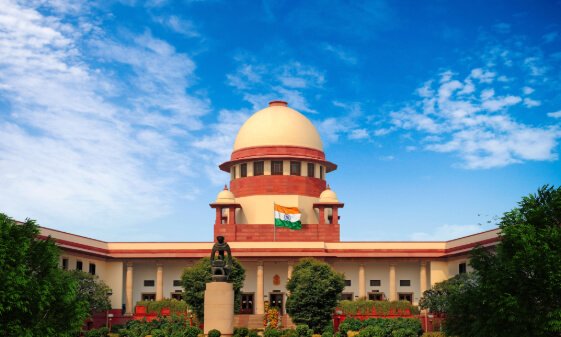Supreme Court Asks Why ED Is Being Used for Political Battles
Quashes Summons to Karnataka Chief Minister Siddaramaiah’s Wife
July 22, 2025
The Supreme Court rejected the Enforcement Directorate’s (ED) attempt to revive a corruption case involving Karnataka Chief Minister Siddaramaiah’s wife, B.M. Parvathi, in the Mysore Urban Development Authority (MUDA) scam, criticising the agency for its politically motivated action.
The ED had issued summons to Parvathi over alleged irregularities in land allotment by MUDA. The Karnataka High Court quashed those summons in March 2024, saying they were not legally justified. The ED then appealed that decision in the Supreme Court.
On July 21, the Supreme Court not only upheld the High Court’s decision but also criticised the ED for what it saw as politically motivated action, as reported by Bar and Bench. A bench led by Chief Justice B.R. Gavai told the ED bluntly that political fights should happen through elections, not in courts, and questioned whether the agency was being misused for political purposes.
The judges even hinted at their past experience in Maharashtra – likely referring to similar allegations of political misuse of investigative agencies – and warned they would be forced to make harsh comments if this pattern continued.
Several high-profile ED investigations in recent years have drawn criticism for being politically motivated, particularly for targeting opposition leaders while sparing those allied with the ruling party.
One of the most cited examples is the series of cases filed against leaders from the Congress party, including Sonia Gandhi and Rahul Gandhi, in connection with the National Herald case. The ED questioned them for hours over allegations related to property transfers and alleged financial irregularities, despite the case being politically dormant for years. Critics viewed the timing of the summonses as suspicious, often coinciding with opposition protests or elections.
In West Bengal, Chief Minister Mamata Banerjee’s government has repeatedly accused the ED of targeting her party leaders to weaken the Trinamool Congress. The arrests of senior leaders like Partha Chatterjee in the school jobs scam and Anubrata Mondal in a cattle smuggling case were seen by Banerjee and her supporters as part of a larger political strategy to discredit the party ahead of elections. The ED’s activity in Bengal has notably intensified during periods of political tension with the Centre.
In Delhi, Aam Aadmi Party (AAP) leaders have faced a string of ED investigations. Deputy Chief Minister Manish Sisodia was arrested in the alleged liquor policy scam, a case the party claims is fabricated. The ED and CBI opened multiple cases around the same time, with Chief Minister Arvind Kejriwal also receiving summons. AAP has consistently argued that these actions are aimed at stopping their expansion beyond Delhi and Punjab.
In Maharashtra, former ministers Anil Deshmukh and Nawab Malik, both from parties opposed to the ruling party at the centre, were arrested and jailed for long periods by the ED. The arrests came at a time when the then-Maha Vikas Aghadi (MVA) government was under political pressure, and both leaders have claimed that the agency’s actions were retaliatory. Malik’s family has accused the ED of continuing to pursue him even after health complications.
Another example comes from Jharkhand, where Chief Minister Hemant Soren was summoned multiple times by the ED in a mining lease case. The summonses intensified after he refused to support key legislative decisions pushed by the Centre. The Jharkhand Mukti Morcha (JMM) called the ED’s actions “deliberate harassment.”
While the agency insists it is following due process, critics point out that leaders who have crossed over to the ruling party after facing ED scrutiny frequently find their cases slow down or vanish entirely.
At the Supreme Court on July 21, Additional Solicitor General S.V. Raju, representing the ED, offered to withdraw the appeal, likely to avoid a strong rebuke from the Court, but requested that the withdrawal not be treated as a legal precedent. Despite this, the Supreme Court went ahead and formally dismissed the appeal, stating that the High Court’s reasoning for quashing the summons was correct and needed no interference.
The case involves a land deal going back to 2004. Parvathi’s brother Swamy reportedly bought a plot of land that had earlier been acquired and de-notified. He then “gifted” it to Parvathi. Although the land was privately owned, MUDA developed it, which made the transaction irregular.
Parvathi then claimed compensation for this land and allegedly received 14 alternate plots developed by MUDA, plots that were worth significantly more than the original parcel. This was done under a supposed 50:50 scheme. Eventually, she returned the land to the authorities.
The Karnataka High Court judge, M. Nagaprasanna, had not only quashed ED’s summons to Parvathi but also to state minister Byrathi Suresh, who wasn’t even an accused but was still being questioned. The ED challenged this, which led to the appeal in the Supreme Court, and now, its rejection.
You have just read a News Briefing by Newsreel Asia, written to cut through the noise and present a single story for the day that matters to you. Certain briefings, based on media reports, seek to keep readers informed about events across India, others offer a perspective rooted in humanitarian concerns and some provide our own exclusive reporting. We encourage you to read the News Briefing each day. Our objective is to help you become not just an informed citizen, but an engaged and responsible one.

